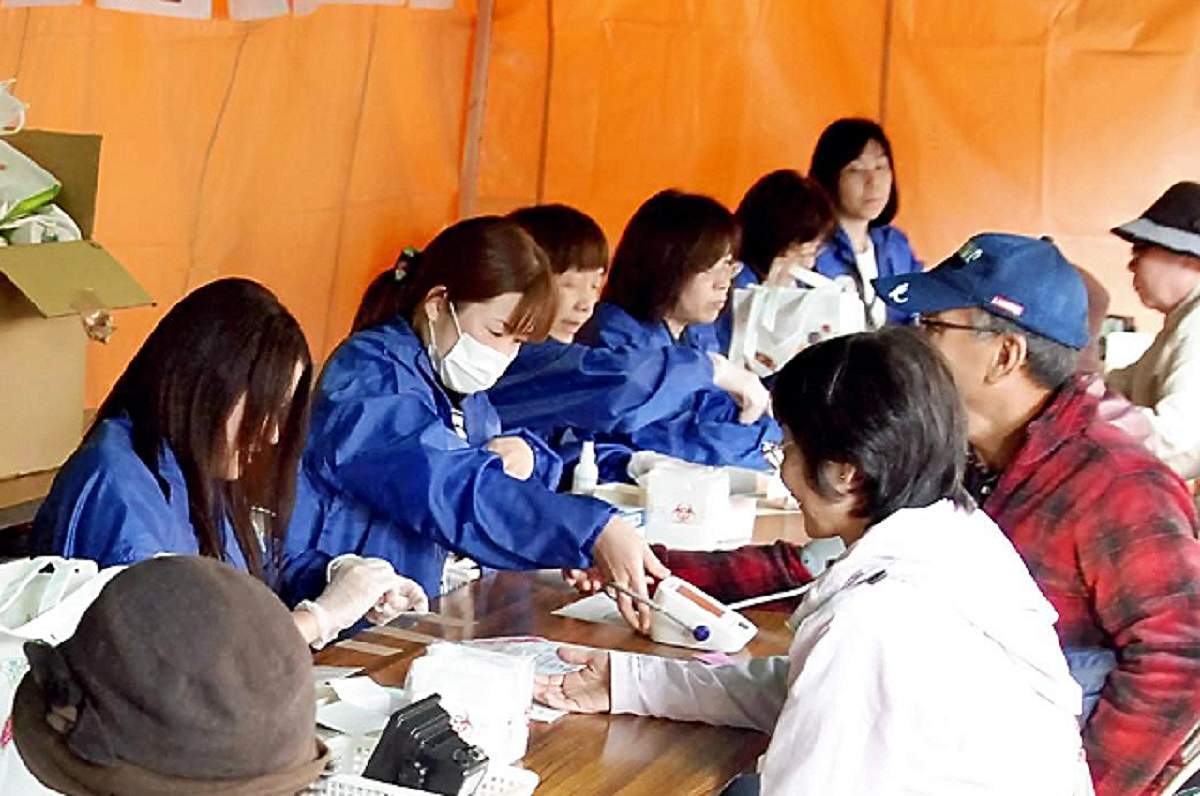
People measure their blood sugar levels as a precaution against diabetes in Kokura-Kita Ward, Kitakyushu, in November 2018.
12:52 JST, December 4, 2024
PARIS (AFP-Jiji) — The percentage of adults suffering from diabetes across the world has doubled over the past three decades, the biggest rises coming in developing countries, a study said Nov. 13.
The serious health condition affected around 14% of all adults worldwide in 2022, compared to 7% in 1990, according to the new analysis in The Lancet journal.
Taking into account the growing global population, the team of researchers estimated that more than 800 million people are now diabetic, compared to less than 200 million in 1990.
These figures include both main types of diabetes. Type 1 affects patients from a young age and is more difficult to treat because it is caused by an insulin deficiency.
Type 2 mainly affects middle-aged or older people who lose their sensitivity to insulin.
Behind the global numbers, national figures varied widely.
The rate of diabetes stayed the same or even fell in some wealthier countries, such as Japan, Canada or Western European nations such as France and Denmark, the study said.
“The burden of diabetes and untreated diabetes is increasingly borne by low-income and middle-income countries,” it added.
For example, nearly a third of women in Pakistan are now diabetic, compared to less than a tenth in 1990.
The researchers emphasized that obesity is an “important driver” of type 2 diabetes — as is an unhealthy diet.
The gap between how diabetes is treated in richer and poorer countries is also widening.
Three out of five people aged over 30 with diabetes — 445 million adults — did not receive treatment for diabetes in 2022, the researchers estimated.
India alone was home to almost a third of that number.
In sub-Saharan Africa, only five to 10% of adults with diabetes received treatment in 2022.
Some developing countries such as Mexico are doing well in treating their population — but overall the global gap is widening, they said.
“This is especially concerning as people with diabetes tend to be younger in low-income countries and, in the absence of effective treatment, are at risk of life-long complications,” said senior study author Majid Ezzati of Imperial College London.
Those complications include “amputation, heart disease, kidney damage or vision loss — or in some cases, premature death,” he said in a statement.
Top Articles in Science & Nature
-

Japan Institute to Use Domestic Commercial Optical Lattice Clock to Set Japan Standard Time
-

Japan to Face Shortfall of 3.39 Million Workers in AI, Robotics in 2040; Clerical Workers Seen to Be in Surplus
-

Record 700 Startups to Gather at SusHi Tech Tokyo in April; Event Will Center on Themes Like Artificial Intelligence and Robotics
-

iPS Treatments Pass Key Milestone, but Broader Applications Far from Guaranteed
-

iPS Cell Products for Parkinson’s, Heart Disease OK’d for Commercialization by Japan Health Ministry Panel
JN ACCESS RANKING
-

Japan PM Takaichi’s Cabinet Resigns en Masse
-

Japan Institute to Use Domestic Commercial Optical Lattice Clock to Set Japan Standard Time
-

Israeli Ambassador to Japan Speaks about Japan’s Role in the Reconstruction of Gaza
-

Man Infected with Measles Reportedly Dined at Restaurant in Tokyo Station
-

Videos Plagiarized, Reposted with False Subtitles Claiming ‘Ryukyu Belongs to China’; Anti-China False Information Also Posted in Japan
























